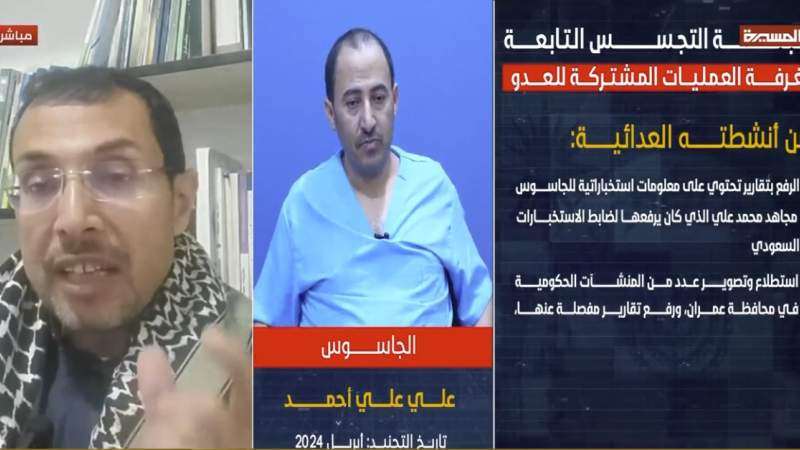Experts: A Turning Point in the Intelligence War Targeting Yemen

News - Yemen: Yemeni analysts say the recent exposure of a trilateral espionage cell—operating for the United States, the Israeli enemy, and Saudi Arabia—marks a critical turning point in the ongoing confrontation, reflecting an escalation into a more complex and sensitive phase of the conflict.
A Strategic Shift in the Confrontation
Writer and journalist Ibrahim al-Wad’ei told Al-Masirah TV that Sana'a now possesses advanced capabilities enabling the dismantling of such networks, particularly as US and Zionist intelligence increasingly rely on covert operations in preparation for a new round of military escalation.
He explained that no military escalation can succeed without prior intelligence work involving information gathering, target mapping, and operational preparation.
Al-Wad’ei stated that the methodology deployed against Yemen mirrors the same US–Zionist approach used for two decades against Hezbollah—where the intelligence work of several countries is unified under a single operations room, with all information ultimately funneled toward the Zionist entity.
He noted that the establishment of the so-called “Peace Management Center” in Gaza, headed by the US ambassador to Yemen, reveals preparations for the next phase—one designed to manage an upcoming confrontation with Yemen. Any intelligence collected by any partner ultimately ends up with the Zionist enemy, he added.
Saudi Arabia Positioned at the Heart of the Intelligence War
Al-Wad’ei said Saudi Arabia’s involvement in operating the recently captured cell places it at the center of the next stage of confrontation. Sana'a now treats Riyadh not as a mediator but as a direct party to the war, especially as Saudi involvement serves as a cover for the real Zionist role that Yemeni society rejects outright.
He warned that the map of confrontation could expand to include other arenas, such as the UAE, if Washington reproduces previous intelligence frameworks used in the hunt for martyr-leader Imad Mughniyeh, when 20 intelligence agencies—including four Arab states—coordinated operations against Hezbollah.
Deterrence, Escalation, and the Battle for Intelligence Superiority
Al-Wad’ei added that the US–Saudi alliance seeks to prolong the current truce for two reasons:
Improved economic conditions and salary payments would reduce recruitment opportunities for traitors.
Continued Yemeni military advancement would shift the regional balance of power in ways Washington does not want.
He stressed that Sana'a can end the truce and move to direct confrontation if necessary, maintaining high readiness to prevent any environment that could allow hostile intelligence to operate.
US and Saudi Arabia Turn to Intelligence Warfare After Military Failure
Strategic affairs expert Mohammad Hazaymeh said the shift toward spy networks inside Yemen reflects the collapse of foreign reliance on military solutions.
He described intelligence warfare as the most dangerous phase of conflict because it targets society from within—exploiting economic hardship, social pressure, and vulnerable individuals through recruitment and financial inducement.
Hazaymeh explained that investigations into recently dismantled networks reveal a consistent US operating pattern: local agents run by joint foreign intelligence rooms composed of Saudi officers and Western handlers. Saudi Arabia, he said, functions merely as an operational arm of Western—particularly American—projects.
He added that the latest network used compartmentalized cells controlled by a single external agency, demonstrating the high level of professionalism and danger involved.
Hazaymeh emphasized that such penetration would not have occurred had Yemen not become a decisive regional actor capable of reshaping the region’s strategic landscape.
He also highlighted the role of the late Chief of Staff, Martyr General Mohammed Abdulkarim al-Ghamari, in developing military and security readiness, noting that Yemen today possesses unprecedented resilience against US and Zionist infiltration attempts.
Zionist Espionage in Yemen Relies on Saudi Arabia as a Cover
Israeli affairs expert Nazar Nazzal said the exposure of the latest espionage cell sheds light on how the Zionist and US intelligence services depend heavily on Saudi Arabia as a cover to recruit agents and relay intelligence into a joint operations room shared by the CIA and Mossad.
Nazzal stated that the Zionist enemy lacks the operational reach inside Yemen required for direct actions. This explains, he said, why the Israeli entity has not claimed attacks targeting senior Yemeni military leaders such as General al-Ghamari.
He noted that this indirect approach is an extension of older Mossad strategies documented in Iraq during the 1980s and 1990s, where international workers and intermediaries were used to gather intelligence for Western and Israeli agencies.
Saudi Arabia, he added, serves as the main façade because Yemeni public sentiment rejects any direct cooperation with the Zionist enemy—even among mercenary factions.
A Broader Regional Intelligence Campaign
Nazzal explained that the Zionist entity routinely exploits US relations with Arab states to expand its intelligence footprint—sharing information through a centralized network linking Mossad with the CIA and various regional partners.
He warned that the exposure of the espionage cell reflects the Zionist entity and Washington’s failure to build their own independent spy network inside Yemen, forcing them to depend on Saudi Arabia.
The revelation, he concluded, demonstrates Sana'a’s growing intelligence strength and its preparedness for any future attack.
The exposure of Saudi spy cells follows a series of high-profile security operations in Yemen targeting foreign intelligence networks. These developments highlight the continuing collapse of Saudi strategy in Yemen and the strengthening of Yemen’s security and counter-espionage capabilities in the post–Al-Aqsa Flood regional landscape.
#Yemen #US #Israel #Saudi Intelligence about 2 days
-
11:30
Lebanese News Agency: one person killed in an Israeli enemy airstrike on the town of Mansouri in southern Lebanon
11:04
Palestinian sources : Israeli enemy aircraft struck east of Al-Shujaiya in Gaza City
10:09
Palestinian sources: Wounded after an Israeli enemy drone bombed Al-Zaytoun in southeast Gaza City
10:07
Iranian Deputy Foreign Minister Kazem Gharibabadi tells Al-Masirah: The United States bears full legal responsibility for the attack on our nuclear facilities
10:07
Head of Iran’s Atomic Energy Organization Mohammad Eslami tells Al-Masirah: The attack on our nuclear facilities is unprecedented in history





